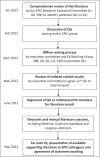Defining quality indicators for best-practice management of inflammatory bowel disease in Canada
- PMID: 24839622
- PMCID: PMC4049258
- DOI: 10.1155/2014/941245
Defining quality indicators for best-practice management of inflammatory bowel disease in Canada
Abstract
Background: There is a paucity of published data regarding the quality of care of inflammatory bowel disease (IBD) in Canada. Clinical quality indicators are quantitative end points used to guide, monitor and improve the quality of patient care. In Canada, where universal health care can vary significantly among provinces, quality indicators can be used to identify potential gaps in the delivery of IBD care and standardize the approach to interprovincial management.
Methods: The Emerging Practice in IBD Collaborative (EPIC) group generated a shortlist of IBD quality indicators based on a comprehensive literature review. An iterative voting process was used to select quality indicators to take forward. In a face-to-face meeting with the EPIC group, available evidence to support each quality indicator was presented by the EPIC member aligned to it, followed by group discussion to agree on the wording of the statements. The selected quality indicators were then ratified in a final vote by all EPIC members.
Results: Eleven quality indicators for the management of IBD within the single-payer health care system of Canada were developed. These focus on accurate diagnosis, appropriate and timely management, disease monitoring, and prevention or treatment of complications of IBD or its therapy.
Conclusions: These quality indicators are measurable, reflective of the evidence base and expert opinion, and define a standard of care that is at least a minimum that should be expected for IBD management in Canada. The next steps for the EPIC group involve conducting research to assess current practice across Canada as it pertains to these quality indicators and to measure the impact of each of these indicators on patient outcomes.
HISTORIQUE :: Il existe peu de données publiées sur la qualité des soins des maladies inflammatoires de l’intestin (MII) au Canada. Les indicateurs de qualité clinique sont des paramètres quantitatifs utilisés pour orienter, surveiller et améliorer la qualité des soins aux patients. Au Canada, où les soins universels peuvent varier considérablement entre les provinces, les indicateurs de qualité peuvent cerner des lacunes dans la prestation des soins des MII et standardiser l’approche de prise en charge interprovinciale.
MÉTHODOLOGIE :: Le groupe Emerging Practice in IBD Collaborative (EPIC) a produit une courte liste d’indicateurs de qualité en matière de MII, fondée sur une analyse bibliographique fouillée. Un processus de vote itératif a été privilégié pour sélectionner les indicateurs de qualité. Lors d’une rencontre du groupe EPIC, le membre jumelé à chaque indicateur de qualité a présenté les données probantes en appui à cet indicateur, puis des discussions ont suivi pour convenir de la formulation des énoncés. Tous les membres EPIC ont ensuite ratifié les indicateurs de qualité retenus dans le cadre d’un vote final.
RÉSULTATS :: Onze indicateurs de qualité ont été établis pour la prise en charge des MII dans le système de santé à payeur unique du Canada. Ils sont axés sur un diagnostic précis, une prise en charge convenable et opportune, la surveillance de la maladie, la prévention ou le traitement des complications des MII et leur thérapie.
CONCLUSIONS :: Ces indicateurs de qualité sont mesurables, reflètent les données probantes et les avis d’experts et définissent une norme de soins qui représente le minimum à atteindre dans la prise en charge des MII au Canada. Le groupe EPIC effectuera maintenant des recherches pour évaluer les pratiques en cours au Canada d’après ces indicateurs de qualité et pour en mesurer les effets sur les résultats cliniques des patients.
Figures

References
-
- Crohn’s and Colitis Foundation of Canada . The Impact of Inflammatory Bowel Disease in Canada: 2012 Final Report and Recommendations. Toronto: Crohn’s and Colitis Foundation of Canada; 2012. < www.isupportibd.ca> (Accessed June 2013)
-
- Canadian Council on Health Services Accreditation . A Guide to the Development and Use of Performance Indicators. Ottawa: Canadian Council on Health Services Accreditation; 1996.
-
- Mainz J. Defining and classifying clinical indicators for quality improvement. Int J Qual Health Care. 2003;15:523–30. - PubMed
-
- Malenka DJ, O’Connor GT. The Northern New England Cardiovascular Disease Study Group: A regional collaborative effort for continuous quality improvement in cardiovascular disease. J Comm J Qual Improv. 1998;24:594–600. - PubMed
-
- Quon BS, Goss CH. A story of success: Continuous quality improvement in cystic fibrosis care in the USA. Thorax. 2011;66:1106–8. - PubMed
Publication types
MeSH terms
Grants and funding
LinkOut - more resources
Full Text Sources
Other Literature Sources

